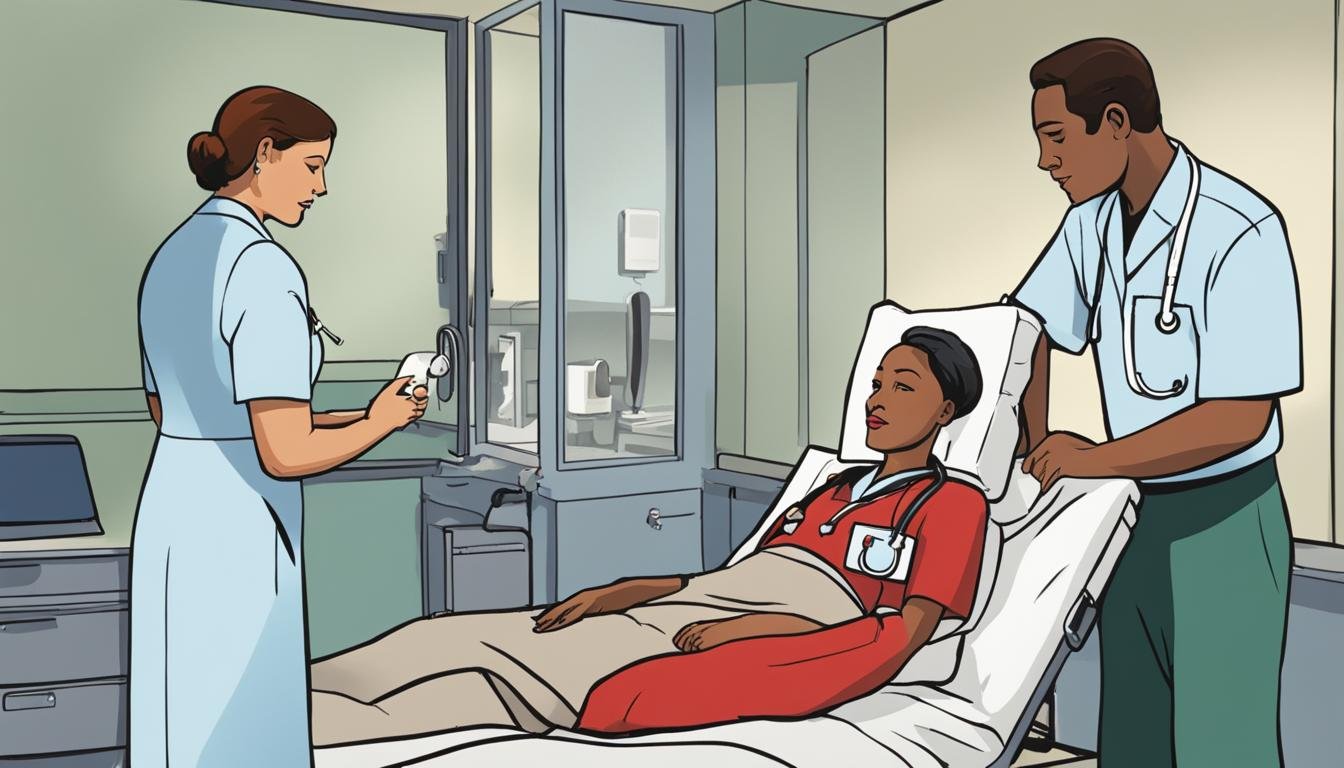Essential Soft Skills in Nursing for Quality Care
“The simple act of caring is heroic.” – Edward Albert
Soft skills are the backbone of quality nursing care. While technical expertise is essential, it is the compassionate and empathetic qualities that truly elevate patient experiences and outcomes. In the fast-paced world of healthcare, it is these soft skills that create a healing environment and build trust between nurses and their patients.
Key Takeaways:
- Soft skills in nursing, such as empathy and effective communication, are vital for providing quality care.
- Empathy in nursing practice creates a supportive environment where patients feel understood and respected.
- Effective communication in nursing promotes collaboration, enhances patient safety, and fosters positive outcomes.
- Problem-solving, time management, cultural competence, and stress management are also critical soft skills for nurses.
- Autonomy and professionalism are essential aspects of nursing that contribute to quality care.
Understanding Hard Skills vs. Soft Skills in Nursing
In nursing, it is essential to have a comprehensive understanding of both hard skills and soft skills. Hard skills are the technical abilities that healthcare professionals acquire through education and training. These skills are directly related to performing tasks such as administering medications, conducting assessments, or operating medical equipment. On the other hand, soft skills are interpersonal qualities that contribute to professionalism and patient-centered care.
Hard skills in nursing encompass the technical abilities required to deliver safe and effective patient care. Nurses must possess a strong foundation in medical knowledge, understanding the intricacies of various procedures, and following protocols accurately. These skills are crucial for ensuring competent care and meeting the healthcare industry’s standards.
Soft skills, however, are equally vital in nursing. These skills, such as empathy, communication, and cultural competence, enable nurses to establish meaningful connections with patients, their families, and colleagues. Soft skills elevate the patient experience and improve overall clinical outcomes by creating a healing environment built on trust, understanding, and collaboration.
When it comes to patient care, hard skills provide the technical know-how, while soft skills shape the human connection that defines quality nursing.
While hard skills focus on technical abilities, soft skills enable healthcare professionals to engage with patients on a deeper level and address their emotional and psychological needs. Effective communication helps nurses understand patients’ concerns, provide clear instructions, and foster effective teamwork.
Empathy, a vital soft skill in nursing, allows healthcare professionals to put themselves in patients’ shoes, understand their emotions, and provide compassionate care. Cultural competence helps nurses navigate diverse patient populations and deliver care that respects and considers cultural values and norms.
It is important to recognize that both hard skills and soft skills are integral to nursing practice. By combining technical competence with empathetic care, nurses can provide holistic, patient-centered care that encompasses both the physical and emotional well-being of individuals.
Hard Skills vs. Soft Skills in Nursing
| Hard Skills | Soft Skills |
|---|---|
| Medical knowledge | Communication |
| Technical procedures | Empathy |
| Administration of medication | Cultural competence |
| Assessment skills | Collaboration |
| Medical terminology | Active listening |
The combination of hard skills and soft skills ensures that nurses deliver safe and compassionate care while building meaningful connections with patients.
Next, we will explore the importance of empathy and compassion in nursing, and how these soft skills contribute to the healing process.
Empathy and Compassion in Nursing
At the heart of nursing lies the invaluable qualities of empathy and compassion. When nurses embody these qualities, they create a supportive environment where patients feel understood, cared for, and respected. Empathy in nursing is the ability to perceive and understand a patient’s emotions, allowing nurses to provide holistic care that addresses not only physical needs but also emotional and psychological well-being.
Compassionate care in nursing goes beyond technical skills and medical knowledge. It involves demonstrating genuine concern, kindness, and a nurturing approach towards patients. By showing compassion, nurses can establish trust and build strong therapeutic relationships with their patients, which greatly contributes to positive outcomes.
Nurses can express empathy and compassion in various ways. Gestures like offering reassurance, actively listening to patients, and providing personal attention can make patients feel valued and supported. Taking the time to sit with a patient and understanding their fears and concerns can go a long way in alleviating anxiety and promoting a sense of well-being.
Fostering Empathy and Compassion
Nurturing empathy and compassion in nursing requires an open mind and a genuine willingness to connect with patients on a deeper level. Nurses can enhance their empathetic abilities by practicing active listening, putting themselves in the patient’s shoes, and being mindful of both verbal and non-verbal cues. Recognizing the unique experiences and perspectives of each patient fosters empathy and reduces bias or judgment.
“Empathy is about finding echoes of another person in yourself.”
– Mohsin Hamid
Through empathy and compassion, nurses can offer support during difficult times, provide comfort, and offer encouragement to patients and their families. This level of care promotes healing, enhances the patient experience, and contributes to overall well-being.
| Benefits of Empathy and Compassion in Nursing |
|---|
| 1. Improved patient satisfaction |
| 2. Enhanced patient outcomes and recovery |
| 3. Building trust and rapport |
| 4. Increased patient compliance and engagement in their care |
| 5. Reduced anxiety and distress |
| 6. Greater job satisfaction for nurses |
By embodying empathy and compassion, nurses can create a safe and caring environment for patients, facilitating their healing journey and empowering them to actively participate in their own care.
Effective Communication in Nursing
Effective communication is a fundamental skill that plays a crucial role in nursing practice. It is essential for building strong connections with patients, promoting collaboration within healthcare teams, and delivering patient-centered care. Clear and concise communication not only helps prevent misunderstandings but also reduces errors and enhances patient safety. Nurses who possess excellent communication skills are better equipped to provide quality care and improve overall healthcare outcomes.
One important aspect of effective communication in nursing is the use of clear language. Nurses should strive to use simple, jargon-free terminology when communicating with patients, ensuring that they understand the information being conveyed. By avoiding complex medical terms, nurses can foster a greater sense of trust and comprehension, enabling patients to actively participate in their own care.
Non-verbal cues are also crucial in communication, allowing nurses to convey empathy, understanding, and reassurance without words. Active listening, maintaining eye contact, and displaying open body language are effective non-verbal techniques that nurses can utilize to create a supportive and empathetic environment for patients.
Moreover, employing the teach-back method is an effective way to assess patient understanding and verify the accuracy of information provided. By asking patients to explain back what they have learned or understood, nurses can identify any gaps in knowledge and address them promptly.
“Effective communication is not just about conveying information; it is about establishing a connection, building trust, and fostering a healing relationship with patients.”
Ultimately, effective communication in nursing is a skill that can be honed and improved over time. By continuously striving to enhance their nursing communication skills, nurses can promote better patient outcomes and contribute to the overall quality of care delivered.
Benefits of Effective Communication in Nursing:
- Enhanced patient satisfaction and experience
- Improved patient safety and reduced medical errors
- Stronger patient-nurse relationships
- Increased patient engagement and participation in care
- Enhanced collaboration among healthcare team members
Tips for Effective Communication in Nursing:
- Use clear and simple language when speaking with patients.
- Pay attention to non-verbal cues and use them to convey empathy and understanding.
- Engage in active listening to ensure patients feel heard and understood.
- Employ the teach-back method to verify patient understanding.
- Practice effective written communication, such as using proper documentation techniques.
| Barriers to Effective Communication in Nursing | Strategies to Overcome Them |
|---|---|
| Lack of time due to busy schedules | Prioritize effective communication and allocate dedicated time for patient interactions. |
| Misunderstanding or misinterpretation of information | Use clear and concise language, and encourage patients to ask questions for clarification. |
| Language or cultural barriers | Utilize interpreter services or language assistance tools to overcome language barriers. Show respect for cultural differences and adapt communication approaches accordingly. |
| Emotional distress or physical discomfort | Show empathy and create a supportive environment for patients to express their concerns. Address their emotional and physical needs promptly. |
Creative Problem-Solving in Nursing
Problem-solving and critical thinking skills are indispensable in nursing, enabling healthcare professionals to navigate unanticipated situations and deliver high-quality care. Nurses must possess the ability to think critically and find innovative solutions when confronted with challenges like supply shortages or sudden changes in patients’ health status. Additionally, adapting quickly to new circumstances and adjusting teaching methods to cater to individual patient needs are essential components of creative problem-solving in nursing.
The ability to think outside the box and approach problems from different angles is a valuable asset for nurses. By using critical thinking skills, nurses can analyze complex situations, consider various perspectives, and make informed decisions that positively impact patient outcomes. Nurses who excel in problem-solving possess a strong capacity for critical thinking and are adept at applying logical reasoning and analytical skills to resolve healthcare dilemmas.
Furthermore, creative problem-solving in nursing involves proactively seeking solutions and collaborating with interdisciplinary teams to develop innovative approaches. Effective problem-solvers in the nursing profession demonstrate resilience, adaptability, and open-mindedness when faced with intricate challenges. They actively engage in brainstorming sessions, gather relevant information, and utilize evidence-based practices to devise personalized care plans that address patients’ unique needs.
The Importance of Critical Thinking in Nursing
Critical thinking plays a fundamental role in nursing as it enables healthcare professionals to make sound clinical judgments and deliver safe, effective care. In the context of problem-solving, critical thinking allows nurses to assess complex situations, identify potential risks, and develop appropriate interventions. It fosters confident decision-making by considering all available evidence, evaluating the credibility of information, and weighing the potential outcomes.
“Critical thinking is the key to identifying innovative solutions and providing exceptional patient care. It involves the deliberate examination of all available options, bending the limits of conventional approaches, and embracing new perspectives.”
Enhancing Problem-Solving Skills in Nursing
To enhance problem-solving skills in nursing, healthcare institutions can implement strategies that foster critical thinking and encourage a culture of innovation. These strategies include:
- Providing ongoing education and training programs that focus on critical thinking, problem-solving techniques, and evidence-based practices.
- Encouraging interdisciplinary collaboration and regular team meetings to promote collective problem-solving and information sharing.
- Creating opportunities for nurses to participate in clinical simulations and case studies that challenge their problem-solving abilities.
- Establishing mentorship programs that pair novice nurses with experienced professionals who can offer guidance and share problem-solving strategies.
By investing in the development of problem-solving skills and critical thinking abilities, healthcare organizations can empower nurses to provide optimal care that aligns with evolving healthcare needs.
| Benefits of Creative Problem-Solving in Nursing | Examples |
|---|---|
| Enhanced patient outcomes | Developing innovative approaches to pain management |
| Improved patient satisfaction | Creating personalized care plans that consider patient preferences |
| Efficient resource utilization | Implementing strategies to minimize medication waste |
| Enhanced teamwork and collaboration | Engaging in interdisciplinary problem-solving discussions |
Time Management in Nursing
Effective time management is crucial for nurses to provide efficient and quality care to their patients. By prioritizing tasks, creating schedules, and optimizing workflow, nurses can ensure that they allocate sufficient time to address each patient’s needs in a timely manner, minimize delays in care delivery, and maintain a smooth operation in the healthcare setting.
One strategy for effective time management in nursing is prioritization. Nurses should assess each patient’s needs and urgency, and prioritize tasks accordingly. This involves determining which tasks require immediate attention and which can be delegated or postponed. By focusing on high-priority tasks first, nurses can ensure that critical needs are addressed promptly.
Creating schedules or to-do lists is another helpful time management tool. By organizing tasks and assigning specific time slots for each, nurses can stay organized and ensure that all necessary tasks are completed. This helps prevent important responsibilities from being overlooked or delayed.
A significant aspect of time management is identifying activities that can be completed simultaneously. For example, while waiting for laboratory results, nurses can use that time to attend to other patient needs, such as medication administration or patient education. By combining tasks, nurses can maximize their efficiency and productivity.
Overall, effective time management is a crucial skill for nurses to master. It allows them to provide comprehensive and timely care to their patients, while also minimizing stress and preventing burnout. By prioritizing tasks, creating schedules or to-do lists, and combining activities, nurses can optimize their time and ensure that each patient receives the attention and care they deserve.
Cultural Competence in Healthcare
Cultural competence plays a vital role in providing high-quality healthcare services that meet the diverse needs of patients. By understanding and respecting cultural differences, healthcare professionals can create a healing environment where patients feel valued, heard, and understood. This helps to foster better communication, build trust, and improve health outcomes.
One way nurses can demonstrate cultural competence is by educating themselves about different cultures and customs. This includes learning about traditions, beliefs, and practices that may impact a patient’s healthcare experience. By gaining cultural knowledge, nurses can provide culturally sensitive care and avoid making assumptions based on stereotypes.
Respecting cultural norms is another important aspect of cultural competence. Recognizing and honoring the values and beliefs of patients from diverse backgrounds can enhance the therapeutic relationship and promote a sense of trust. Nurses should prioritize open-mindedness, empathy, and non-judgmental attitudes when delivering care to individuals with different cultural backgrounds.
Language barriers can also hinder effective communication and understanding in healthcare settings. Nurses can utilize language services, such as interpreters or translation tools, to bridge the gap and ensure clear communication with patients who have limited English proficiency. This promotes accurate information sharing and helps patients make informed decisions about their healthcare.
Cultural competence in healthcare is essential for creating a supportive and inclusive environment that honors diversity. By embracing cultural differences, nurses can provide patient-centered care that respects individual beliefs, values, and preferences. This not only enhances the overall healthcare experience but also leads to improved health outcomes for all.
Stress Management in Nursing
Nurses face intense pressure and emotional demands in their work, making stress management crucial for maintaining well-being and providing quality care. The demanding nature of the profession can have a detrimental impact on both physical and mental health, leading to burnout and decreased job satisfaction.
Practicing self-care is essential for nurses to cope with stress and prevent burnout. By prioritizing their own well-being, nurses can ensure they have the energy and resilience to care for others effectively.
Self-care for nurses can involve:
- Getting enough sleep: Quality sleep is vital for physical and mental rejuvenation. Nurses should prioritize sleep and establish healthy sleep routines.
- Eating healthily: Proper nutrition provides the necessary nutrients for energy and overall well-being. Nurses should make conscious choices to fuel their bodies with nutritious foods.
- Engaging in relaxation techniques: Activities like deep breathing exercises, meditation, or yoga can help nurses unwind and relieve stress.
Moreover, setting boundaries between work and personal life is crucial for stress management. Nurses should strive to allocate dedicated time for rest, relaxation, and engaging in hobbies or activities they enjoy outside of work. This separation helps prevent work-related stress and allows nurses to focus on their own well-being.
By incorporating self-care practices and boundaries, nurses can effectively manage stress, enhance well-being, and provide high-quality care to their patients.
Autonomy and Professionalism in Nursing
Autonomy in nursing is a fundamental component of providing high-quality care. It empowers nurses to make independent decisions based on their knowledge, expertise, and the best interests of their patients. With autonomy, nurses can take the lead in advocating for their patients’ needs, actively participate in clinical discussions, and contribute to improving healthcare outcomes.
Professionalism goes hand in hand with autonomy in nursing. It involves demonstrating the right attitude, approach, and ethical standards in all aspects of patient care. Professional nurses treat patients and colleagues with respect, uphold confidentiality, and prioritize patient well-being. By maintaining professionalism, nurses cultivate trust, foster positive relationships, and contribute to a collaborative healthcare environment.
“Autonomy is the essence of nursing. In combination with professionalism, it enables nurses to provide exceptional care and positively impact the lives of their patients.”
The Importance of Autonomy in Nursing
Autonomy enables nurses to exercise their clinical judgment, draw upon their experience, and make informed decisions in the best interest of their patients. It allows them to tailor care plans to individual needs, adapt interventions based on patient responses, and provide personalized support that promotes optimal health outcomes. With autonomy, nurses can:
- Assess patient needs comprehensively and provide individualized care plans.
- Initiate necessary interventions promptly and advocate for timely treatment.
- Continuously monitor patient progress and adjust care strategies accordingly.
- Identify and address potential risks or problems in patient care.
The Significance of Professionalism in Nursing
Professionalism is integral to nursing as it establishes a framework for ethical behavior, accountability, and the delivery of compassionate care. Professional nurses exhibit the following qualities:
- Respect: Treating patients, colleagues, and other healthcare professionals with dignity and acknowledging their autonomy.
- Integrity: Maintaining honesty, trustworthiness, and ethical standards in all interactions and professional relationships.
- Empathy: Demonstrating empathy by understanding and responding to patients’ emotional and physical needs with compassion.
- Communication: Effectively communicating with patients, their families, and the healthcare team to promote collaboration and ensure the delivery of safe, patient-centered care.
| Benefits of Autonomy in Nursing | Essential Aspects of Professionalism in Nursing |
|---|---|
|
|
…”Being autonomous doesn’t mean working alone; it means taking responsibility and having the freedom to make decisions that positively impact patient care while upholding the highest standards of professionalism.”
By embracing autonomy and professionalism in nursing, healthcare providers can collectively elevate the standard of care, promote patient safety, and create a nurturing environment that supports both patients and the healthcare team.
Conclusion
Soft skills are crucial in nursing, playing a vital role in providing quality care and creating a healing environment for patients. Empathy, effective communication, problem-solving, time management, cultural competence, stress management, autonomy, professionalism, critical thinking, and open-mindedness are all essential soft skills that nurses should possess.
By practicing and continually honing these skills, nurses can enhance the overall patient experience and improve healthcare outcomes. Empathy allows nurses to connect with patients on a deep level, creating a sense of trust and understanding. Effective communication ensures clear and concise interactions, reducing errors and promoting patient safety.
Problem-solving and critical thinking skills help nurses navigate complex situations, adapt quickly, and find creative solutions. Time management allows for optimal allocation of resources and prioritization of patient needs. Cultural competence fosters an inclusive environment that respects the diverse backgrounds of patients, thus improving communication and trust.
Stress management and self-care are essential for nurses to maintain their well-being and prevent burnout, ultimately ensuring the delivery of quality care. Autonomy and professionalism empower nurses to make independent decisions, advocate for patients, and maintain ethical standards.
Overall, these soft skills contribute to nursing care that is compassionate, patient-centered, and of the highest quality. To provide the best possible care, nurses should continuously develop and strengthen these essential soft skills throughout their careers.








